#the best hotel in tel aviv
Explore tagged Tumblr posts
Text
#hotel#israel#tel aviv#tel aviv accommodations#tel aviv hotels#tel aviv hotels on the beach#tel aviv hotel deals#suite hotel tel aviv#executive suites tel aviv#sea view hotel tel aviv#suite hotel in tel aviv#apartment hotel tel aviv#beach view apartments tel aviv#hotel tel aviv israel#spa hotel tel aviv#the best hotel in tel aviv#beach apartments tel aviv#tel aviv accommodation
2 notes
·
View notes
Text
As a teenager, I was embarrassed about liking chopped liver. To be fair, I was embarrassed about most things — my parents, my lack of the coolest sneakers, and my freckles among many other things. But liking chopped liver was high up on the list. It was just one of those gross foods: aesthetically unappealing, greyish and mushy, and just plain weird. None of my non-Jewish schoolmates had ever heard of anything like it.
But it tasted so damn good. All of it did — my grandmother’s, made from beef livers and shimmering with schmaltz served weekly at Shabbat lunch; the mass-produced packaged stuff that was kind of gristly, in a not-all-bad way; the scoops of it sandwiched between two slightly stale slices of white bread at the kosher deli (which may well have been the packaged stuff); and best of all, the creamier pate-like offerings, topped with a sweet fruit chutney, served at Friday night buffets in Israeli hotels. Chopped liver was rich and didn’t require a lot of effort — you barely needed to chew it. It also sparked an iron-fueled rush of energy. It was my guilty pleasure.
I didn’t realize I had been so spoiled in the chopped liver department until I left home from England, to Israel, where it was actually quite hard to find. Israeli chefs were deep into a returning-to-culinary-roots movement but hadn’t really delved into the Ashkenazi kitchen yet, preferring the spicier, sexier Mizrahi dishes like kubbeh and upscale stuffed pita sandwiches. I could find chopped liver in haredi areas like Bnei Brak, but it was a real schlep.
So I did what any committed liver enthusiast would do: I started making my own. I had my grandmother’s recipe, but beef livers were hard to come by, so I set my sights on a chicken liver version I’d found in Geila Hocherman’s Kosher Modern cookbook. This was more a pate; it departed from tradition in some quite ballsy ways, like adding capers! And thyme! And chili flakes! I was intrigued.
Finding chicken livers wasn’t a problem — there were trays of them, slippery and pink, in the Carmel Market in Tel Aviv. And, like those my Ashkenazi ancestors cooked within Eastern Europe, they were cheap and sold raw. Back at home, I gave my grandmother a call and she, delighted by my culinary undertaking, gave me step-by-step instructions. First I had to rinse the livers, salt them, and broil them — this was going to take some time.
I tend to be an impatient cook — technique-heavy, complicated recipes bring out the worst in me. But the process of making chopped liver was unexpectedly enjoyable. Growing up in an Orthodox community, my role as a woman often felt passive, mostly consisting of watching the men participate in Judaism. So it felt new, and welcome, to take on the active task of preparing the livers, with instructions passed down through my matriarchs for generations.
Once they’d been sufficiently broiled on both sides, I added the livers to a pan with caramelized onions, capers, thyme chili flakes, and a splash of white wine. Then I blitzed the mixture and a few slices of soaked bread with a hand mixer and steeled myself for a taste.
While the unorthodox ingredients added a saline spurt and chili zing, the chopped liver tasted wonderfully familiar. It was my take on all the other versions I’d gorged myself on before — not competing with them, but adding something a little new. I was content and even proud. I sat at the kitchen table with a glass of red wine, a box of crackers, and a jar of mango chutney and ate half my homemade liver in one sitting. Not the healthiest snack, I grant you, but it was an important reminder to me that sometimes it is worth investing time in the kitchen to please only yourself. Making chopped liver began as an exercise in nostalgia but turned out to be much more — an act of culinary self-care.
7 notes
·
View notes
Text
Netanya: Israel's Hidden Gem
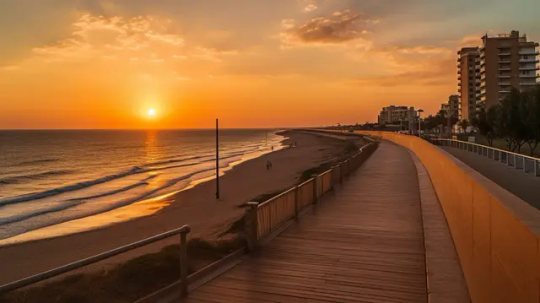
Welcome to Netanya, a mesmerizing city located on the stunning coastline of Israel. Boasting gorgeous beaches, a rich cultural heritage, delectable gastronomy, and a host of activities for both relaxation and adventure, Netanya is an unexplored treasure for travel aficionados. Let's embark on a virtual journey to explore this coastal gem's hidden enchantments that are bound to leave you spellbound.
When to Go
Netanya's climate is Mediterranean, characterized by warm summers and mild winters. The best time to visit is during spring (March to May) and autumn (September to November) when the weather is agreeable and tourist crowds are fewer. During these seasons, the temperature averages around 20-25°C (68-77°F), creating the perfect conditions for outdoor exploration.
How to Get There
Netanya lies just 20 miles north of Tel Aviv and is easily reachable from Ben Gurion International Airport. From the airport, Netanya is accessible via taxi, private transfer, or public transportation. Regular buses and trains connect the two cities, offering a convenient and economical travel option.
Where to Stay
Whether you are looking for a luxury beachfront resort, a boutique hotel, or a cozy guesthouse, Netanya caters to all preferences and budgets. Popular choices include the Ramada Hotel & Suites, the Island Suites Hotel, and the West Lagoon Resort Netanya.
What to Do
1. Immerse Yourself in Culture Begin your cultural exploration at the charming Herzl Street, a beautiful blend of modernity and tradition. This boulevard, adorned with unique architecture, boutique stores, and local eateries, offers an authentic taste of Israeli life. 2. Delight in Gastronomy Netanya's vibrant culinary scene offers both traditional Israeli fare and international cuisine. Relish fresh seafood dishes with panoramic views of the Mediterranean Sea. Savor the local delicacy, shakshuka, in one of Netanya's quaint local cafes. 3. Embark on Outdoor Adventures Netanya's pristine beaches and clear waters provide endless opportunities for outdoor activities. Bask in the sun at Poleg Beach, snorkel or dive in the Marine Reserve, or stroll along the scenic promenade. If you crave adrenaline, try paragliding over the appealing coastline. 4. Discover Historical Sites Learn about Netanya's fascinating history at the Heritage Museum, which chronicles the city's development and early settlers. A short drive from Netanya will take you to the ancient city of Caesarea, where you can explore Roman ruins and an ancient amphitheater.
Where to Eat
Netanya's culinary scene is a delightful mix of traditional Israeli cuisine and international flavors. Try the irresistible falafel at Mezcal, enjoy authentic Middle Eastern cuisine at The Old Netanya, or opt for a romantic dinner with a view at Olive & Fish.
Sights and Tours
1. The Blue Bay This stunning marine reserve offers snorkeling and diving tours, allowing you to explore a vibrant underwater world of colorful coral reefs and diverse marine life. 2. Netanya Promenade Stroll along Netanya's extensive promenade along the coastline. Take in the breathtaking views of the Mediterranean Sea, admire the meticulously landscaped gardens, and stop for refreshments at the cafes and restaurants dotted along the way.
Tips and Advice
Respect local customs, especially when visiting religious sites. Dress modestly, cover your shoulders and knees, and be mindful of cultural norms. Also, remember to stay hydrated, as Netanya can get quite hot, especially in the summer.
Money
The local currency is the Israeli Shekel (ILS). ATMs are widespread throughout Netanya, and most establishments accept credit cards. It's advisable to carry some cash for small purchases or for places that may not accept cards.
Nightlife
Netanya's nightlife teases with a mix of trendy bars, clubs, and live music venues. Try delicious cocktails and live music at The Blue Bar, dance the night away at Liquid Club, or sip wine while admiring a breathtaking sunset view at Island Lagoon.
Transport
Netanya's public transportation network, including buses and trains, makes it easy to explore the city and its surroundings. Taxis and car rentals are readily available for those who prefer more flexibility in their travels.
Shopping
From modern malls to bustling markets, Netanya offers a variety of shopping experiences. Visit the Ir Yamim Mall for a wide range of international brands, explore the colorful stalls of the Netanya Market for fresh produce and local souvenirs, or browse the charming boutique shops along Herzl Street for unique finds. Netanya stimulates the senses with its perfect blend of relaxation, adventure, culture, and gastronomy. Whether you're seeking a tranquil beach getaway, a journey into history and heritage, or an opportunity to indulge in delectable food, Netanya has something for every traveler. Pack your bags, immerse yourself in this coastal paradise, and witness the enchanting allure of Netanya. Safe travels! Read the full article
2 notes
·
View notes
Text
Tel Aviv warmly welcomes kosher travelers with a variety of hotels and restaurants. Enjoy the delicious food of Tel Aviv while keeping kosher with ease.
Plan It Israel has curated everything for your perfect Tel Aviv experience. From the best hotels to top restaurants, every detail is taken care of. With Israel travel made easy, you can enjoy luxury accommodations and exceptional dining. Trust Plan It Israel to deliver an unforgettable visit to Tel Aviv.
0 notes
Text
Occupationism
Today, 12/11/24, after considerable searching, I found the article I wrote for Newtopia Magazine of my experience visiting the West Bank in 2004. Here it is:
In early 2004, I traveled to Israel and the occupied territories with a cousin who is a professor and member of the Faculty for Israeli-Palestinian Peace (FFIPP), a coalition that opposes Israeli occupation of the West Bank, Gaza and East Jerusalem. It should be noted that the delegation could not enter the Gaza Strip, which Israel has basically closed off to the international community. Here I'll focus on what I saw and the people I met in the West Bank, a perspective rarely or unfairly covered in American mass media, which is ironic considering that each year the U.S. gives more money to Israel than to any other country in the world. Americans should know where their taxes are going.
I arrive in Tel Aviv around 8:00 pm, and search for a shuttle to take me to the Notre Dame hotel where the next day I'll be meeting with 12 or so FFIPP members and Hanna Knaz, an Israeli who will be our guide. No one's heading to East Jerusalem so I'm bumped off of several shuttles and have to wait over an hour before getting my ride.
As requested, I'm dropped off at the Notre Dame Hotel but it's not in the old city where I was told it would be, and the attendant can't find my reservation. I ask if there's another Notre Dame inside the old city and there is. Minutes later, a Palestinian cab driver picks me up. The old city is not even a minute away, and we drive through one of the formidable, ancient, arched entryways that leads inside. Even at night, the largest of these, the Damascus Gate, built in the 1500s under the rule of an Ottoman sultan, is magnificent. Upon entering, three Israeli guards, wearing fatigue and sporting machine guns, briefly talk to the cabdriver then let us proceed. We ride on a narrow cobblestone street then reach another point where three Israeli soldiers sit. They stop the cabdriver, get up and begin sharply asking him several questions, their brusque tone especially unsettling because they appear to be about 18 and the cabbie is at least twice that. The imbalance of power is striking.
The Notre Dame in the old city turns out to be a hostel for Christian pilgrims, definitely not where I was supposed to meet the FFIPP, but it's considerably cheap and I'm exhausted. A woman named Rita brings me to a room and as we walk upstairs and onto a terrace, she says, "Best view in town." And it truly is something else. The huge gold dome of the Al Aqsa mosque is practically next door and it's all lit up. In the distance, hundreds of houses dot hilly landscapes and above them crosses, crescents and spires punctuate the night sky. For a person who's gone to Catholic school for 12 years yet no longer subscribes, it suddenly seems very odd to be in a place like this, and yet after what I've seen on the street it also seems kind of right.
Day 2
The next morning I meet with the delegation in Jerusalem at The Alternative Information Center (AIC), a Palestinian-Israeli organization that "disseminates information, research and political analysis on Palestinian and Israeli societies." Michael Warschawski, Director of the AIC and author of the forthcoming book "On the Border" (South End Press), discusses the rapid erosion of the Green Line, or the borders of the occupied territories. On a map, he demonstrates how the West Bank, a land about the size of Delaware, has been and continues to be broken into non-contiguous islands. Breaking them apart are Israel's building of the Wall and Israeli "settlements" that are connected by "bypass roads."
The words "settlements" and "bypass roads" make very caustic and volatile practices appear almost benign. The reality is that the Israeli government encourages its citizens as well as Jews from around the world to move into the West Bank and Gaza to secure more land, a practice that is illegal under international law. The Fourth Geneva Convention states, "An occupying power shall not deport or transfer parts of its own civilian population into territory it occupies," and several UN Security Council Resolutions, including 446, 452 and 465, state that settlements are not legally valid and should be removed.
After Warschawski's presentation, we board a bus and head to the Qalandia checkpoint in the West Bank… It's teeming with people attempting to get in and out, which can take hours, so a lo-fi kind of commerce has resulted, from young boys selling Chiclets gum to adults at small, makeshift tables selling food or dishware and plastic gadgets from China. Thanks to the yellow color of our Israeli license plates and our possession of American passports, we have no problem getting in, and zip freely through the region using the Israeli-only bypass roads. On our way, a curious thing: bordering both sides of the highway for miles are walls with drawings of trees and land. This marks one of many surreal moments during this trip. These walls are vistas devoid of people, when in fact what resides behind them are Palestinians.
After some time, the make-believe vista ends, and we're passing through hilly landscape when Warschawski says, "Okay everyone – look!" He points to a settlement at the top of a hill. The way most of us scramble over you'd think the settlement was a rare sight but once Warschawski points this one out we keep seeing them. They stand out sorely because most sit atop hills, often above water reservoirs so as to better control them, and they typically have red roofs. Ostentatiously short on character, they remind me of the plastic hotels from the board game Monopoly. These are houses that have been built and moved into very quickly.
Warschawski takes us to the Palestinian town of Abu Dis to see the Wall, which rises to different heights depending on the area you're in. When I first see it, the Wall is roughly 6 feet high. I observe a man helping an old woman who's attempting to climb over. I try to imagine my mother doing the same each day, and the fact is - I can't. Clearly this section of the Wall cannot stop a determined person from getting across, but it will cause difficulty and humiliation to civilians who need to go about their daily lives.
The Wall strangely dissects the neighborhood we're in, as if a crew of confused masons came by and plopped it there arbitrarily. As Warschawski demonstrated earlier on a map, the Wall does not follow the official borders of the territories, it weaves throughout them, greatly reducing Palestinian land, often appropriating valuable water resources. "Water is a microcosm of the occupation, a metaphor depicting the divergent fortunes of two groups, one with power to control where water flows, the other suffering from an enforced thirst," states author and professor Gary Fields. "Contrary to our image of the region as an arid place, the West Bank is rich in underground aquifers. Historically, Palestinians succeeded in tapping these springs as a source of sustenance and sustainability...After 1967, Israel, upon surveying Palestinian water wells in the West Bank, issued four edicts that would alter the way water would be allocated and controlled..." These edicts have made many Palestinians dependent on Israel for water. In districts such as Jayeous, residents receive water every three days and only for a couple of hours.
Warschawski takes us to a more secluded area of Abu Dis where the Wall rises to a formidable 25 feet. A recent U.N. report said the lives of as many as 400,000 Palestinians will be disrupted by the Wall. Its presence strangles commerce, prohibits access to work, school, health care...In the region of Qalqilya, the Wall encircles the town. Gates are scheduled to open at certain hours but Israeli guards are often late, a practice that further disrupts any semblance of a normal life for civilians. Abdul-latif Khaled, a Palestinian hydrology engineer who lives in the area said, "There is a big difference between a prison and what the Wall has done to us here...In prison, the authorities try to keep you in. Here, the Israeli authorities are trying to make us go out."
Building of the Wall has also escalated the Israeli army's practice of mowing down olive groves, the livelihood of many Palestinians. Some trees have existed for hundreds of years. Aside from the irony of the destruction of a historical symbol of peace, there's the very disturbing reality that livelihood, nature and centuries of time can be so easily wiped out in minutes.
Olive trees are what triggered army commander Rami Kaplan to leave the Israeli Defense Force (IDF) after ten years. "One day we came to a Palestinian town without notice. We had 2 bulldozers, tanks and infantry, and started cutting line by line of olive trees. From the beginning, I refused to be part of such a mission but one day I agreed to replace a commander who was out…I was standing on a hill, seeing our tanks and bulldozers as they started crossing the fence and going into an area that was to be stripped. When the Palestinians saw the vehicles approaching they ran into an orchard to collect as many olives as they could before the trees were cut. Then, when our forces approached and it became too risky for them, they left and went to a distant area, sat and watched bulldozers cut, line by line, the trees."
Rami, along with two of his colleagues, spoke to the FFIPP delegation in Tel Aviv, in the basement office of Courage to Refuse, a refusnik organization that formed in 2002 when 50 officers and soldiers signed The Combatants Letter. Printed in Israel's daily Ha'aretz, the letter sparked considerable controversy. The initiators of the letter were Captain David Zonshein and Lieutenant Yaniv Itzkovits, officers in an elite unit. After having served four years in compulsory service and another eight years as reserve soldiers, including periods of active combat in Lebanon and in the occupied territories, they concluded that "the missions confided to them as commanders in the IDF had in fact nothing to do with the defense of the State of Israel, but were rather intended to expand the colonies at the price of oppressing the local Palestinian population." The letter inspired 200 other signatories to join them in less than two weeks.
Chan Alon, a refusnik who served for years as an IDF commander told us, "Things changed when I started understanding that the Israeli army is not simply a defensive force. The height of this feeling came 2 years ago when I went to the occupied territories as a father of a 3-year-old daughter, and suddenly I had a different perspective ...When you're a 19-year old soldier, you don't understand what it is for parents of a child to stay in their house for two weeks under curfew … In the last days of my service, they called us to demolish a Palestinian house in the village of El Hada…I asked why and they said ‘because they have an illegal balcony.' I told them I couldn't do it, that people from the village will come and try to prevent it, that they'll have weapons. And I was told, ‘Now you're starting to understand the action.'"
Later That Afternoon
We leave Tel Aviv and head to the West Bank to see a settlement called "Ariel." The generic, functional design and primary colors of Ariel's buildings give the town a make-believe feel. We stop at a supermarket that's bustling with shoppers and I approach several and ask if I can interview them on video. All say no, except for a man who can barely speak English, and another man who speaks fluently but doesn't say much except that he doesn't live inside the settlement, just attends university there because he would otherwise not be able to afford such a reputable school. It's a telling statement. While many people move to settlements to appropriate land, there are also some, such as recent Jewish immigrants from Russia and Ethiopia, who move to them for financial reasons as the Israeli government bestows settlers with fabulous economic incentives in order to increase population. In Ariel, we passed signs advertising ultra-cheap property for which 90% of the cost would be given as mortgage by the bank, 10% by a mortgage company.
Evening
We approach a checkpoint. The traffic is phenomenal. Lines of barely moving cars travel in both directions but divisions are not clear and sometimes cars meet head on. Civilians walk through this mess and the sound of motors and horns relentlessly persists. It takes about an hour and a half to finally get out.
Day 4
The 2nd International Conference "An End to Occupation. A Just Peace in Israel-Palestine: Towards an Active International Network" begins. Hundreds of academics and speakers from around the world attended this two-day conference. Speakers included Judith Butler, Ilan Pappe and Dr. Hanan Ashrawi, recipient of the 2003 Sydney Peace Prize. The dialogue created by these speakers was informative and often inspiring but it was a Palestinian audience member who spoke impassionedly about Israel's continuing takeover of water and land, and the humiliation of the Palestinian people, that moved me most. He looked like someone's grandfather with white hair, glazed blue eyes and a slight hunch. He spoke English fluently and wore a blue suit. My cousin and I asked if we could videotape/interview him and he said yes.
We met up with Mr. Nashashibi that afternoon. He was born in Jerusalem in 1925, and though the house he grew up in is still there, he is not allowed to live in it because he joined the army and fought for Palestine during the 1948 war. For many years, he lived in Syria and Jordan. He's had a decades long, prestigious career in finance, and presently serves as a Member of the Executive Committee of the P.L.O.
"During the Jordanian administration, I used to be able to visit my parents in Palestine each year but after 1967 and Israeli occupation, I was not allowed to visit until I returned to live here in 1994."
Nashashibi discussed the nightmare of travel in the occupied territories, how permits are required to go from area to area within Palestinian territory. "Something I will never forget is that my younger brother was sick in Jerusalem in July and I applied to visit him. They did not give me permission until he died, so I couldn't see him until his funeral."
When asked about settlers and how some claim they have a right to stay in the occupied territories now that a third generation is being born, Nashashibi responds, "What about those who lived here for hundreds of years? I am one of them. My family lived in Palestine for 850 years and now I cannot go back? How can you explain this to me?"
We talked for a long time with Nashashibi and when things were winding down he said, "I'd like to respond to the issue of terrorism. In accordance with the Geneva Convention, we have the full right to raise arms against occupiers. Why are we deprived of that right and when we practice that right we're considered terrorists? ...The Israeli army demolished Jenin, Rafah and now they're killing people in Nablus. Why isn't this criticized by the U.S. media? We have the right to resist …Settlers are occupiers, the army defends them, and we can't just look at them and say ‘God bless us, we hope that they'll leave peacefully because they won't."
We're heading to Ramallah. At the checkpoint in Aram, an old man leans on a cane and begs for change, young boys sell Chiclets, and I observe the great range of Palestinian women's clothing – from jeans and trendy tops to the traditional robe. None have their faces covered.
We drive in the Eastern part of the West Bank, on an Israeli-only highway, and head to Birzeit University. Once there, we meet with 5 professors and 4 students. After introducing ourselves, one of the professors leaves after learning that Hanna is Israeli. She apologizes and says her actions shouldn't be taken personally but if she stays it could give people the false impression that Palestinians and Israelis are on equal ground. The remaining professors and students speak with us about the life during occupation.
Reem Wahdan, a female student who speaks fluent English, states, "It horrifies me to see that a 10-year-old kid in Nablus is not scared to hang onto a tank. What kind of people are we creating in this society? Traumatized children and murderers, yes, on both sides, and this will come to back to our societies, this occupation. Whenever I think of Ramallah as a prison it kills me. I have an American passport but because I have a green ID card, I can't go in and out of it. It's amazing."
In 1988, the Israeli army closed Birzeit University. It did not reopen until 1992 although during those 4 years the University continued operating underground. Today, students have to struggle with checkpoints, some of which are roaming, in the sense that Israelis will come and suddenly set up shop in different areas without warning. Often this shuts the university down because it takes students hours to get in. For the past month, the road to the university has been opened.
"This is my last year at Birzeit. I'm in my 4th year. Every day, I wake up and wonder what life will look like in the future," says Abeer Avekat. "Life in Jerusalem is important, we go there to pray and everything ... but it takes 3 hours to get here because of the checkpoints. When I reach here I don't want to study."
Wearing a denim cap and hoop earrings, a student named Hiba Darwish states, "After September 11th, our image in American media became considerably worse. Just imagine how it feels when there's no justice in the world … I've met lots of Americans and it surprises me how they don't know what's going on. They only see Israel on the map. I tell them I'm from Palestine and they think I'm talking about Pakistan."
Later that night
We're staying in Ramallah. I take a walk with a few other FFIPP members to get dinner. On our way we pass numerous posters of Palestinians who have died or who have been imprisoned. We walk to a densely populated area with shops and men standing on corners vending smoked corn on the cob and other snacks. Graffiti lines the walls. One line, written in English, states, "The world closes its eyes, but we see all crime."
Day 7
We head to Jenin. On the way we pick up a female Palestinian Doctor who, along with Hanna who is a nurse, works for Doctors Without Borders. When we get to the checkpoint, soldiers question Hanna extensively: Why do we want to go into this particular area?
45 minutes and several phone calls later, we're able to go through. Because of Israeli roadblocks, we're told it's going to take a while to get from this checkpoint, by the small village of Jelamy, to Jenin. Or, as a young Palestinian cabbie poetically put it, "It used to take one cigarette to get from here to Jenin, but now it takes a whole pack."
One pack of cigarettes later and we're in Jenin. We leave our bus and walk past a horse made of large scraps of colored metal that stands in the center of a crossroads. The word "ambulance" is written across one of the metal squares that come from vehicles demolished in April 2002.
On April 3, 2002, Israel invaded the Jenin refugee camp, claiming it a "hotbed of Palestinian militancy," and declaring it a closed military zone. Depending on whom you ask, what followed was either a battle or a massacre. Terje Roed-Larsen, a United Nations Envoy who toured the Jenin refugee camp about a week and a half afterwards, was quoted in the BBC news as follows, "It is totally destroyed, it looks like an earthquake has hit it … I am watching two brothers pull their father from the ruins, the stench of death is horrible. We are seeing a 12-year-old boy being dug out, totally burned … It is totally unacceptable that the government of Israel for 11 days did not allow search and rescue teams to come. This is morally repugnant."
Human Rights Watch (HRW), the largest human rights organization based in the United States, conducted a weeklong fact-finding investigation in Jenin in late April 2002. The following comes from their website: "The Israeli Defense Force's (IDF) campaign caused extensive and disproportionate destruction of the civilian infrastructure of the camp, particularly in the Hawashin district following an April 9 ambush of Israeli soldiers there. In contrast to other parts of the camp where armored bulldozers were used mainly to widen streets, in Hawashin they razed the entire district. Throughout the camp, at least 140 buildings were completely leveled, many of them multi-family dwellings, and more than 200 others were severely damaged, leaving an estimated 4,000 people, more than a quarter of the population, homeless … During most of ‘Operation Defensive Shield,' the IDF blocked emergency medical access to Jenin camp. Soldiers repeatedly fired on Red Crescent ambulances and in one case shot to death a uniformed nurse, twenty-seven-year-old Farwa Jammal, who had come to the assistance of a wounded man."
It's a rainy day in Jenin. We head to the local hospital, the only one, we're told, in a district of 350,000 people. Inside, the jacket I'm wearing can't keep out the chill, and we walk through hallways packed with people moving about or standing against the walls waiting. We head upstairs, which is just as cold and crowded, and head to the office of the hospital's director, Dr. Mohammed I. Abu-Ghali. Several bullet holes mark a wall.
Dr. Abu-Ghali talks about April 2002. "The hospital became a prison. We had nothing – no food, medication, and they didn't permit us to get out. Even going to the windows was impossible … they would shoot at us. We told them we had bodies here and had no place to put them, there was no room in the morgue. There were several Israeli tanks by the hospital. One day the Red Cross was permitted to come here. They had to walk, they couldn't use cars. And the IDF gave us two hours to bury bodies in the garden for the first time."
After talking with Dr. Abu-Ghali, we leave and walk in muddied streets to an area about the size of a football field. It's littered with rubble. One can see that houses once stood here, as some fragments remain. An old man wearing a suit jacket smokes. A lone boy stands in the street watching us, hands on hips, lips down-turned, gray eyes staring. We pass a lone house where one wall on the second floor is missing. A curtain hangs across it. People are still living there. In the distance, I see that new houses are being built, and a large blue sign states in English and in Arabic, "United Nations Jenin Camp Rehabilitation Project. Donor – UAE Red Crescent."
It's my seventh day on this delegation, and I have a pounding headache. A group of children come over. They're 4, 5, 6, 7 years old. They don't say much just observe us from several feet away and smile. I take a seat on the ground when a Palestinian boy appears and shyly points to my video camera. I tape him for about 15 seconds and play it back for him. He wears a sweater that's several sizes too large and there's a hint of a smile on his face.
I walk up a hill and videotape the landscape. Minutes later, someone gently tugs my sweater. I turn to see the boy who I had videotaped earlier. He suddenly stops smiling when he sees my troubled face. My one regret during my time in the occupied territories was that I couldn't figure a way to hide my emotions from him.
My cousin and I head to the Qalandia checkpoint where an international women's group, including Palestinians and Israelis, will be demonstrating against the occupation. We're with Kathy Kamphoefner, an American and Quaker representative to Jerusalem. Since we're early, my cousin and I interview her.
"I work for the American Friends Service Committee. My job, along with my husband Paul Pierce, is to advocate for peace and justice in this area. I've been living off and on here for 8 years, mostly in Hebron."
It's not even noon and there's standstill traffic at the checkpoint. Kathy starts describing the scene. "Here there's a large road and two sets of fences … To the left there are taxis to many destinations. It's a good example of how convoluted the system of checkpoints has made things … We can see a whole series of settlements on the hilltops. They go from hilltop to another to another. And that's the settlement strategy. They're planted on hilltops, and originally it's just a few caravans or mobile homes, and then permanent housing is constructed, and then after that they tend to come down the hillsides so eventually where you see hillsides next to each other, they'll construct one continuous settlement and confiscate all the land in between them, thereby constructing a whole settlement block."
After some time, a group of women begin forming. Many are elderly. Israeli soldiers in full riot gear hover around. Signs read: "International March for Freedom and Peace." "Tear Down The Wall." No Peace Without Palestinian Inalienable Rights." Some signs are in Hebrew. The women start chanting "Occupation No More."
Kathy adds, "The Palestinian people are not going to give up. They have lived in this land all their life, as have their grandparents and their grandparents before that. They have deeds for those lands, in most cases. Even when homes are demolished it's on land that belongs to them."
We walk to the demonstration. There are about 150 women protesting. I talk with one who is from the Netherlands who says that women from over 16 countries are there. I ask about her visit to Israel and the occupied territories, and she says, "We saw many things we knew already, but still it's a shock to see it. We're here for an end to the occupation. It's useless and terrible."
After a couple of hours, my cousin, Kathy and I decide to leave. When we get to the Israeli side of the checkpoint, we see about 50 women with signs who are not being allowed to join the demonstration. I speak to one of them, an American named Ridgely Fuller. "I've passed here many times before, and there's never been a problem," she said. "So what concerns me here is that a lot of people want to have a peaceful non-violent resistance but from what I see the Israeli government is preventing that."
Kathy adds, "I ask the American people to investigate this because what they see on the news is not the reality of what's on the ground. The reality is a phenomenal system of oppression of the Palestinians by the Israeli occupation…and the American people are paying for this … The absence of American funds would really make a big difference in peace in this area."
Postscript
In 2004, the 1965 film "The Battle of Algiers" was re-released. Parallels between French occupation of Algeria and Israeli occupation of Palestine are striking. In the last scene of the film a French soldier asks a crowd of Algerians what they want. The response is, "Freedom. Our pride. Independence." And if there's anything that's most disturbing when in the occupied territories it's how the Israeli occupation strips dignity from the Palestinians or at least makes a very concerted effort to do so. Checkpoints are a notorious area where abuse and humiliation are practiced, and groups such as International Checkpoint Watch and Machsom Watch (formed by Israeli women) attempt to monitor and hopefully temper this.
Intense news breaks out from the occupied territories and Israel so often it's hard to keep up. In May, Israeli forces fired a missile and a tank shell into a crowd of Palestinians that was protesting the invasion of a neighboring camp. At least 10 Palestinians – all children and teenagers – were killed, and at least 50 were wounded. Earlier this year, Ariel Sharon announced that Israeli settlers will be moved out of the Gaza Strip and parts of the West Bank, while some settlements in the West Bank will be expanded. This fuzzy logic was heartily approved by George Bush who casually forgot to include a single Palestinian in his discussions with Sharon, yet shook hands with him and told the Palestinians to be brave. This came only weeks after the Israeli army killed the Palestinian spiritual leader Sheikh Ahmed Yassin, an incredibly provocative act. (Provocation, some say, is Sharon's modus operandi as it gives him sanction to commit further incursions upon Palestinians.)
Most recently, the International Court of Justice deemed Israel's Wall illegal. On July 20, 150 countries of the United Nations General Assembly (including all of the European Union) voted in favor of the International Court's request that Israel dismantle the illegal Wall. Only six countries voted against this. The six? The United States, Israel, Micronesia, the Marshall Islands, Australia and Palau…
1 note
·
View note
Text
youtube
SCARDUST feat. PATTY GURDY - "CONCRETE CAGES" (Official Music Video) SCARDUST - Concrete Cages feat. Patty Gurdy (Official Music Video). Taken from the album "Strangers". More music: http://scardust.co/ Follow: https://ift.tt/IFqsymi Like: https://ift.tt/uDzm3B0 Support: https://ift.tt/3GgJVFR Extra special thanks to our Patreon supporters: Lisa Korrigane, Oxana, Heimen Stoffels, Tadeusz Raven, Yotam Braunstein, Stephan Degel, Volodymyr Polosukhin, Michael Didi, Andrei Octavian Dan, David Cooper, Melli Möp, Ben Baskin, Eldar, Daniele Purrone, Rinaldo Chiti, Antonello Mulas, Heiko Maaß, Roger Busquets Duran. You are the best! --- CONCRETE CAGES --- Music and Lyrics: Noa Gruman, Orr Didi Lead vocals and Hurdy Gurdy: Patty Gurdy Lead vocals: Noa Gruman Drums: Yoav Weinberg Guitars: Yadin Moyal Bass: Orr Didi Keyboards: Aaron Friedland Choir: Hellscore --- Video Credits: Hellscore choir singers: Atar Abramson, Bennie Bachner, Danny Semiat, Daria Singer, Dima Fridrich, Enav Kedar, Evgeni Galperin, Goni Davidson, Guy Pery, Hilla Bernstein, Itamar Menuhin-Gruman, Kfir Ben Aroia, Maayan Gad, Michal Friedman, Mikey (Bar) Nadel, Noya Shamir, Ofer Kedar, Ofir Arnon, Sapir Bura, Shani Gruman, Victoria Smolensky, Yarden Gruman Strings Quartet: Violins: Rinat Gruman-Menuhin, Elad Bogomolny | Viola: Hadar Levy | Cello: Tamar Deutsch Gomberoff Producers: - Lahav Levi | Producer (produced by) - Scardust/Noa Gruman | co-producer Concept/Screenplay: Noa Gruman Floor Director: Michael (FRESH) Rom Director of Photography: Guy Bartov Editorial: Noa Gruman | Editor Lahav Levi | Finecut, Colorist, VFX 1st AC, B cam operator (Forest): Orel Betsalel 1st AC, B cam operator (City): Omri Ben David Gaffer: Lee Alfie Lighting Technician: Shachar Alfie Location Manager: David Amar Styling: Maayan Gad Victoria Smolensky Daria Singer Goni Davidson Noa Gruman Yoav Weinberg Noa's hair&makeup and Patty’s hair: Dana Ayalon Choir’s makeup: Hilla Bernstein Michal Friedman Rinat Gruman-Menuhin Reut Paz Natovich Art: Amily Glick Weill Props: Adi Golani Playback: Lev Kerzhner Production Assistants: Lev Kerzhner Yarden Gruman Guy Perry Orin Mashiach Moral Siani Caterer (city): Kfir Ben Aroia B.T.S: Shir Didi Special thanks to: Hotel Indigo Tel-Aviv Shlomi Hdmi Buffery Beer Sheva --- Recording Credits: Bass: Yanai Avnet Keyboard: Itai Portugaly Strings: Alexandra Marcu, Elad Bogomolny, Keren Tannenbaum, Rinat Gruman, Sofie Keren, Yoed Nir --- All rights reserved to Scardust 2022 via YouTube https://www.youtube.com/watch?v=9El7fWOPpY0
0 notes
Text
The Best Tour Bus Companies and Minibus Rentals for a Comfortable Visit to Israel

Discover top Israel tour bus companies. Premium minibus rental services in Tel Aviv, Jerusalem, and across Israel. Book your Israel Bus Rental today at TLV Transfers. TLV Transfers stands out as one of the premier tour bus companies in Israel, offering premium minibus rental services in Tel Aviv, Jerusalem, and beyond. With a fleet of modern and well-maintained vehicles, TLV Transfers provides unmatched convenience and comfort for travelers exploring Israel's most iconic destinations.
Tailored Solutions for Every Group Size
Whether you're traveling with a small group of friends or organizing a large corporate event, TLV Transfers has the perfect minibus rental solution to meet your needs. From compact minibuses to spacious coaches, our diverse fleet can accommodate groups of all sizes, ensuring that everyone travels in style and comfort.

Professional Drivers, Exceptional Service
At TLV Transfers, we prioritize the safety and satisfaction of our passengers above all else. Our team of professional drivers is highly experienced, courteous, and knowledgeable about the local area, ensuring a smooth and enjoyable journey from start to finish. With TLV Transfers, you can sit back, relax, and let us handle all the details of your transportation needs.
Convenient Booking Process
Booking your Jerusalem bus rental with TLV Transfers is quick and easy. Simply visit our website or contact our customer service team to reserve your minibus rental today. We offer flexible booking options and competitive rates to ensure that you get the best value for your money.

Experience Israel in Comfort
Don't let transportation stress put a damper on your Israel adventure. Experience the convenience and comfort of TLV Transfers' premium minibus rental services and explore Israel's top attractions with ease. Book your Jerusalem bus rental today and embark on an unforgettable journey through the heart of the Holy Land.

Benefits:
Effortless Booking Process: Our streamlined booking system makes it easy for customers to reserve a taxi or transfer service online or through our mobile app, ensuring convenience and efficiency.
Reliable and Punctual Service: We understand the importance of punctuality when it comes to airport transportation. Our drivers are punctual and professional, ensuring that customers arrive at their destinations on time, every time.
Comfortable and Safe Travel: Our fleet of vehicles is well-maintained and equipped with modern amenities to ensure a comfortable and safe travel experience for our customers.
Flexible Options: Whether you need a taxi from the airport to your hotel, a transfer between cities, or a customized itinerary, we offer flexible options to meet your specific needs and preferences.
Knowledgeable and Friendly Drivers: Our drivers are knowledgeable about the local area and can provide valuable insights and recommendations to enhance your travel experience in Israel.
24/7 Customer Support: Our dedicated customer support team is available 24/7 to assist customers with any inquiries or concerns they may have before, during, or after their journey.
Experience Israel in Comfort
Don't let transportation stress put a damper on your Israel adventure. Experience the convenience and comfort of TLV Transfers' premium minibus rental services and explore Israel's top attractions with ease. Book your Jerusalem bus rental today and embark on an unforgettable journey through the heart of the Holy Land.
Contacts us:
Call us: +972-3-6039604
E- Mail: [email protected]
#Israel Airport Taxi#Israel Airport Transfers#Taxi tel aviv airport#Tel aviv airport transfer#Jerusalem airport transfer#Taxi from jerusalem to tel aviv#Taxi from Tel Aviv to Jerusalem#Israel tour bus companies#Minibus rental Israel#Israel Bus Rental#Minibus rental Tel Aviv#Minibus rental Jerusalem#Jerusalem Bus Rental
0 notes
Text
Day 1 (Part 2): Korean Travel Essentials
I’m a Welcome Center type o’ gal. I strongly believe that those first, formal tourist info centers sometimes are overlooked gems. Worst case scenario? I wasted a little time before departing the airport. Best? Get those oh-my-gosh-what-would-I-have-done-were-I-not-to-know tidbits. Like, for instance, going to South Korea? Download Naver. ‘Nuff said. It is S Korea’s Google Maps. For me, it was a soother. How much calmer one can be when you know how many subway stops remain til you need to get off? Or, when you clearly see what magical alleyway to walk down, knowing it will take you to the right place. Yes, I like to be in control. Naver helped me take control.
Worth also saying perhaps that in advance of my travels I purchased a regional eSIM, which gave me internet access in the three countries we’ll be visiting. Helpful, indeed! Then one must buy a TMoney pass in order to travel on public transport in Korea.
We clearly were walking on the wrong side of the terminal, and it appeared to be rush hour. We navigated the throngs and got on to the subway. The sad thing? Every single person was staring at a phone. I guess being the home of Samsung this might be a logical transformation, but sad nonetheless. Adamant that I would not be among them, I enjoyed people watching and trying to figure out what the little screens were trying to educate me about— like leaving vacant the pink seats that are meant for pregnant women.
Thank G-d for subways. Imagine every single one of the thousands of people using the train needed to drive in the city… too bad Tel Aviv is only doing a mostly-above-ground light rail.
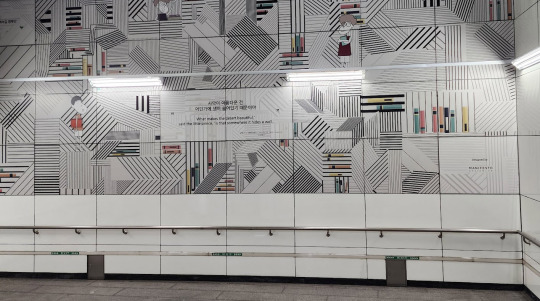
A long walkway from the train took us to the mall where our hotel was housed. Check in and head up to the top floor to admire the view and try to digest the fact that, yes, I am in Seoul. I’ll skip meat so one cow might be saved. I’ll walk up stairwells to try to stay healthy and use just a little less electricity. I’ll avoid disposable anything to do my part. But avoid flying to save CO2 for a greener world? I’m sorry, still too difficult for me, if that means I can’t reach Seoul.
0 notes
Text
Israel, a country rich in
Israel, a country rich in cultural diversity and history, has also become a popular destination for tourists seeking a unique and exciting experience. One such experience that has gained widespread attention in recent years is the world of escort girls in Israel. From Tel Aviv to Jerusalem, these women have carved a niche for themselves in the booming escort industry, offering services that cater to both locals and tourists alike. Escort girls in Israel are often referred to as "Israel's best kept secret." These stunning and alluring women offer much more than just companionship; they provide a complete package of entertainment, intimacy, and adventure. From a romantic evening out on the town, to a sensual massage in the privacy of your hotel room, these girls are trained to provide the ultimate experience for their clients. So who are these escort girls in Israel? They come from all walks of life and backgrounds, adding to the diversity of the industry. Some are models, students, aspiring actresses, or simply women looking for an exciting career. They are carefully selected, trained, and groomed to cater to the needs of their clients. One might wonder, what sets these escort girls apart from their counterparts in other countries? For one, the women in Israel are known for their exotic beauty and charisma. Their Mediterranean features combined with their confidence and intelligence make for a deadly combination. They are well-versed in multiple languages, making communication with their clients a breeze. These girls also possess a deep understanding of Israeli culture and are able to offer a unique perspective on its history and current affairs. Unlike many other countries, the escort industry in Israel is legal and regulated. This means that the women undergo regular health checks and have access to resources and support. This also ensures the safety and well-being of their clients, giving them peace of mind when booking an escort girl in Israel. The women are also trained to maintain strict confidentiality and professionalism, ensuring a discreet and comfortable experience for the client. <a href="https://www.sexy1.co.il/">נערות ליווי</a> But what can one expect from a night out with an escort girl in Israel? The possibilities are endless. From a romantic dinner at a top-rated restaurant, to a night of partying at Tel Aviv's hottest clubs, the girls are able to cater to any request. They are also experts in the art of seduction and can provide a mind-blowing experience in the bedroom. They are willing to try new things and are open-minded, making the experience all the more exhilarating. The escort girls in Israel also offer services that cater to the needs of the LGBTQ+ community. They understand the importance of inclusivity and offer services to all clients, regardless of their sexual orientation or gender identity. This further adds to the diverse and welcoming nature of the escort industry in Israel. In conclusion, escort girls in Israel offer a unique and unforgettable experience for those seeking something out of the ordinary. With their beauty, intelligence, and professionalism, they are able to cater to the needs of their clients and provide a safe and discreet environment. Whether it's a night out on the town or a quiet evening in, these women are guaranteed to make your time in Israel one to remember. So next time you are planning a trip to Israel, consider adding a night with an escort girl to your itinerary – you won't regret it.
0 notes
Photo

The Best Hotels In Tel Aviv Indulge in the luxurious charm of Tel Aviv's finest hotels and experience unparalleled comfort and hospitality. Discover the best accommodation options in the vibrant city.
0 notes
Text

Tel Aviv
At 66 Hayarkon Street, on the corner of Trumpeldor, is the Imperial Hotel, a hotel whose good days are probably behind it, but it manages to survive with a few improvements. Starting at the Imperial Bar, considered one of the best in Israel,
Even before you arrive, you can't help but see a giant 4-story doll sculpture of a cat playing the banjo, in a kind of clown outfit, in a nonchalant pose, standing next to a bird
Photo credit :
Dalia Yerushalmi
1 note
·
View note
Text
The Best Hotels In Tel Aviv

Embark on a journey of opulence and sophistication in Tel Aviv's most prestigious hotels. Explore our carefully curated selection of the city's best accommodations and prepare to be amazed.
0 notes
Text
The best hotels in Israel Diaries

Finding the best hotels in Israel is essential for a unforgettable stay. Travelers seeking value can locate cheap hotels in Israel that don’t compromise on quality. Exclusivity awaits at 5 star hotels in Israel, providing top-notch amenities and service. Regarding the best hotels in Israel, options vary from historic boutiques to contemporary skyscrapers. Great Israel hotel deals can be found year-round, providing luxury attainable. Identifying the best place to stay in Israel depends on personal preferences and travel goals. Be it a central hotel or a seaside resort, choices abound. Every single stay provides a unique look into the rich culture and history of this fascinating land.
Experience Unforgettable Stays: Hotels in Israel
Choosing the right accommodation is essential for an enjoyable Israel trip. Upscale hotels in Israel offer world-class facilities and superb hospitality. Finding cheap hotels in Israel doesn’t mean settling for less, as many offer excellent amenities at affordable prices. Opulent experiences await at 5 star hotels in Israel, which travelers are treated to unparalleled service. The best hotels in Israel showcase a mixture of traditional charm and modern luxury. Incredible Israel hotel deals can be found for planned ahead, providing tremendous value. Finding the best place to stay in Israel involves considering location, amenities, and personal taste. From the bustling streets of Tel Aviv to the quiet cheap hotels in Israel beauty of the Galilee, Israel offers a varied range of hotel experiences. Keep in mind, a good hotel can transform a simple trip into a lasting memory. With so many options, the ideal accommodation in Israel awaits.
0 notes
Photo

The Best Hotels In Tel Aviv Indulge in the luxurious charm of Tel Aviv's finest hotels and experience unparalleled comfort and hospitality. Discover the best accommodation options in the vibrant city.
0 notes
Text
Jessica Minh Anh at The Vista at Hilton Tel Aviv
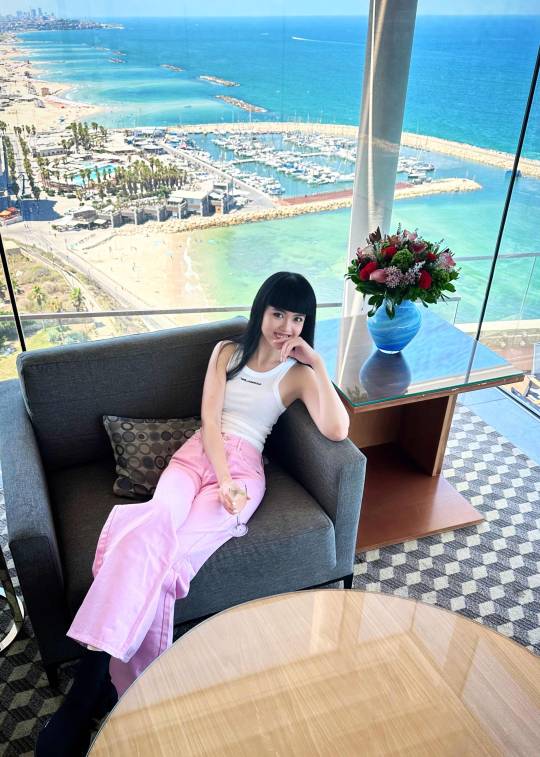
In her recent trip to Israel, Jessica Minh Anh chose to stay at The Vista at Hilton Tel Aviv. Situated at the heart of this bustling city, Jessica's stay at the hotel unfolded as an opulent escape, weaving together comfort and refinement in perfect harmony. Tel Aviv is currently one of the most desirable destinations and the most expensive city in the world.
Jessica's suite's expansive layout unveiled breathtaking sea views from the balcony, a sight that seemed to merge seamlessly with the bedroom.
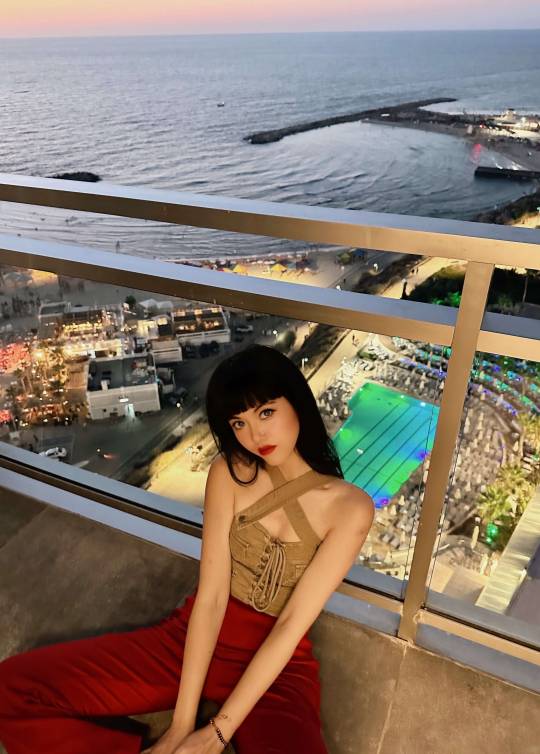
BEST ROOFTOP BAR: VISTA LOUNGE
Jessica's suite included complimentary entry to the 17th-floor panoramic Vista Lounge. The lounge offered an array of both non-alcoholic and alcoholic drinks, accompanied by an assortment of snacks that catered to her palate. The private check-in desk and personalized concierge services truly curated a tailor-made experience, making her stay even more exceptional.

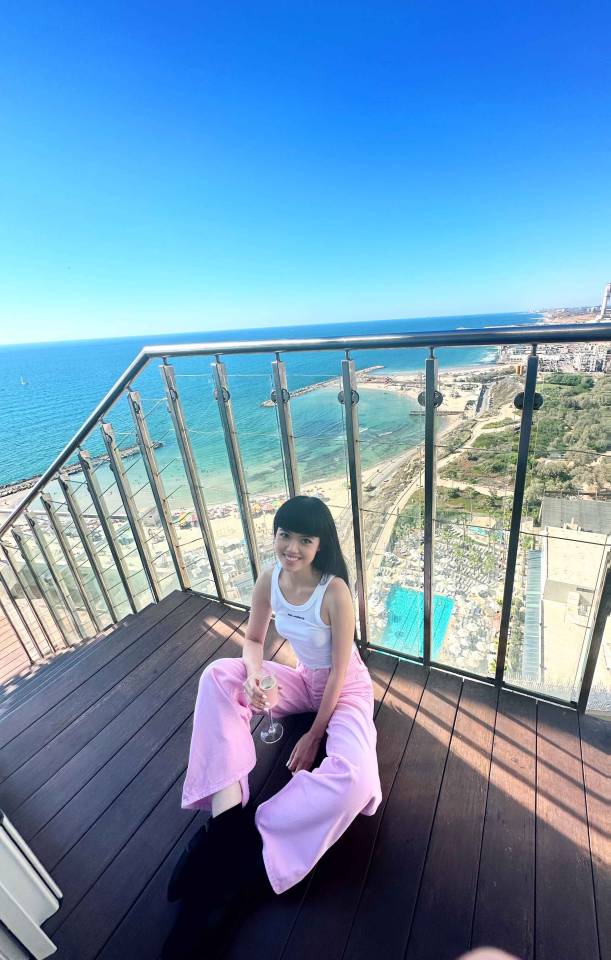
BEST SUSHI RESTAURANT: YAKIMONO
Jessica also had a great culinary adventure at Yakimono Sushi Bar at The Vista Hilton Tel Aviv. The Japanese specialties on offer, from sushi and sashimi to authentic soups and salads, provided a tantalizing taste of Tokyo. Maguro (red tuna) and Kurodai (sea bream) danced on her taste buds, harmonizing beautifully with sake, green tea, and Japanese beer.


BEST SUNSET SPOT: YAFO
In between indulgent moments at the hotel, Jessica explored the city's treasures. She went to enjoy the stunning sunset at the enchanting lanes of Yafo, a former port city that has woven itself into Tel Aviv's modern tapestry.
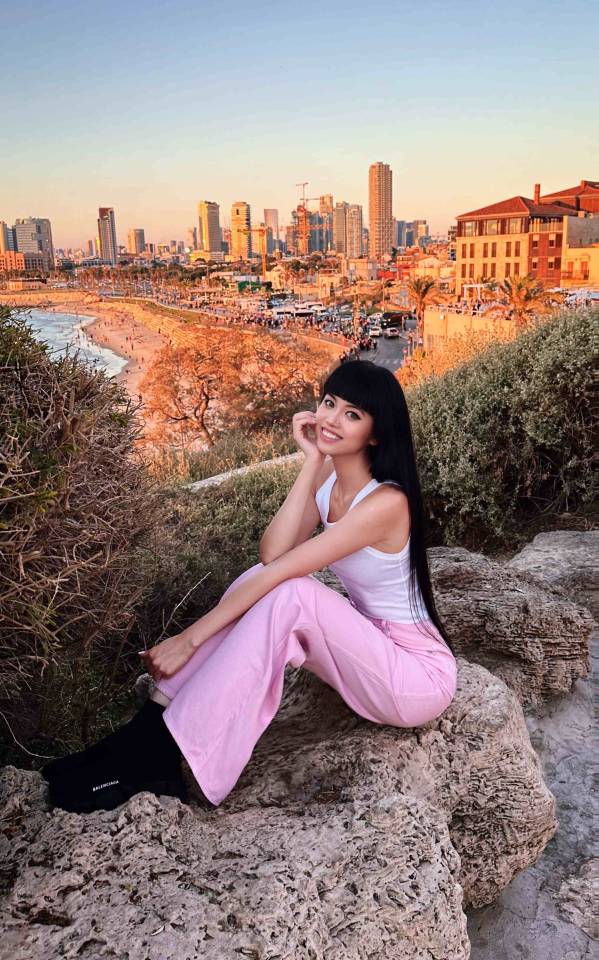
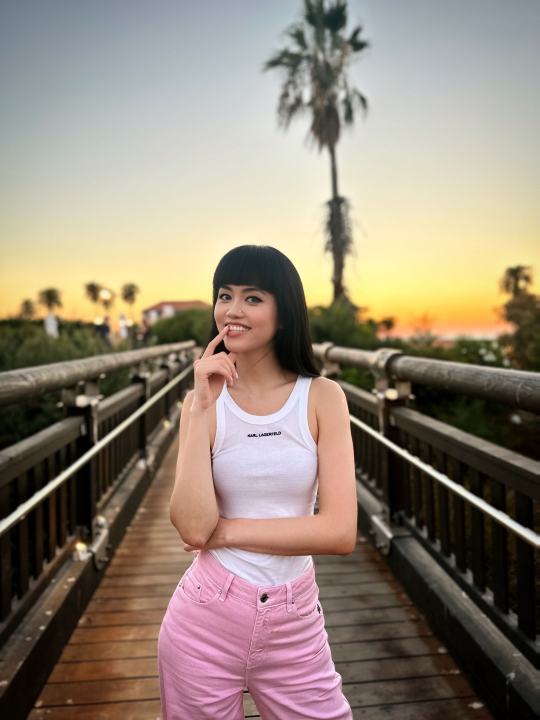
BEST COCKTAIL BAR: BELLBOY
Jessica spent an evening at the BellBoy Bar, a hidden treasure, offering an exclusive and immersive speakeasy experience that captured the essence of Tel Aviv's nightlife. They serve exquisite cocktails in unique glasses, such as the Tooth Fairy in the photo below, and you can easily spend a whole evening totally cut off from the reality outside.

JERUSALEM
No trip to Israel is complete without a pilgrimage to Jerusalem, a city steeped in culture, and spirituality. It was a combination of complex history, beautiful architecture, stunning national parks and striking coastline. Jerusalem was definitely an essential stop on her journey.
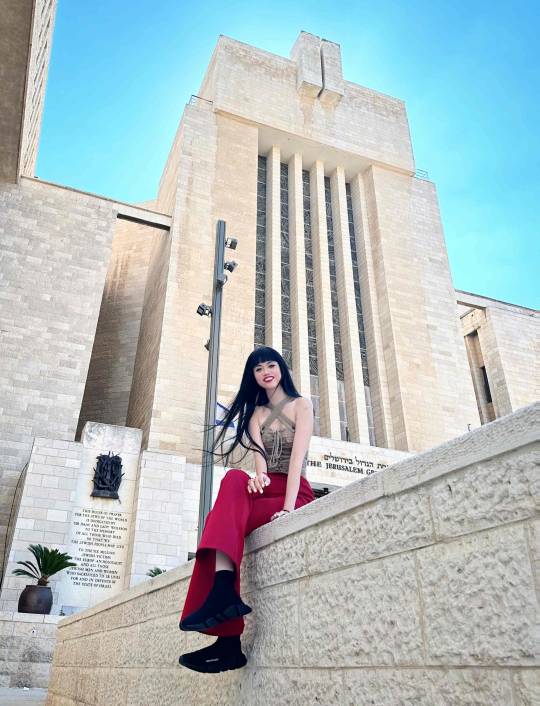

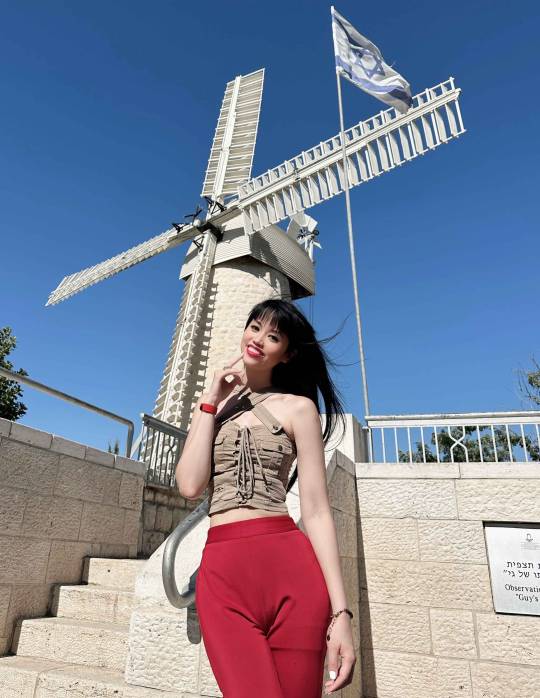
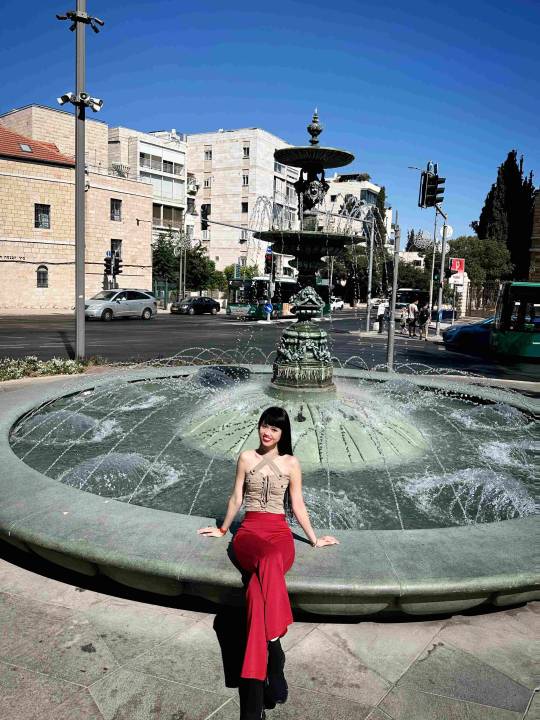
You can’t go wrong with these places. The thing that Jessica liked the most about The Vista at Hilton Tel Aviv, besides its beautiful interior, outstanding view, and delicious food, is the wonderful customer service within the hotel in general and at the Vista Lounge in particular. Every staff was helpful, professional, and charismatic. Jessica is looking forward to coming back!
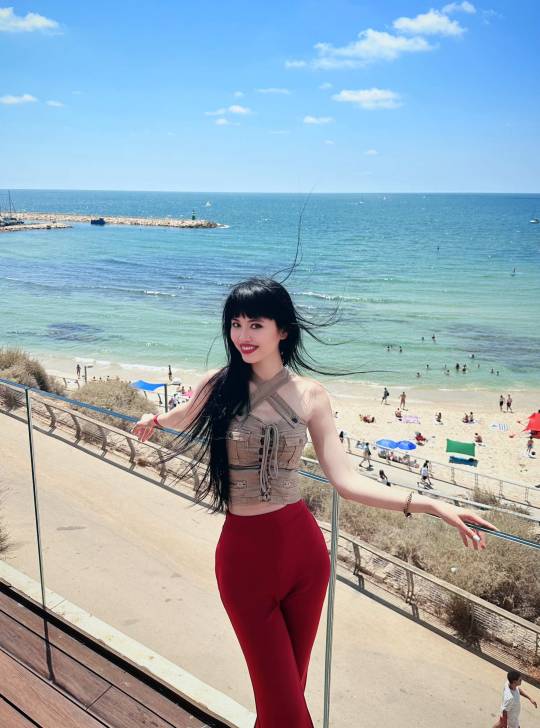
0 notes
Text
JORDAN AND EGYPT FROM TEL AVIV OR JERUSALEM
JORDAN AND EGYPT FROM TEL AVIV OR JERUSALEM
Explore this fascinating journey through the best Egypt and Jordan Tours, take one of our combined Jerusalem Tours, and see the breathtaking Roman ruins in Jordan. Among many other artefacts, visit the Egyptian Museum and the Great Giza Pyramids.
Explore magnificent locations with our JORDAN AND EGYPT FROM TEL AVIV OR JERUSALEM tour. Organise your journey. Travel to Jordan and Egypt. Spend an incredible tour from Cairo to Jordan's Petra, Take a private tour to see Cairo, Aswan, and Luxor, a famous city, before flying to Amman and relaxing in the dead sea with views of Mount Nebo.
Enjoy Jordan's Best Tours Celebrate the amazing travel packages to Egypt and Jordan. Discover the natural splendour of Egypt to Petra. To enjoy the largest natural spa in the world, explore Mount Nebo, Madaba, and the Dead Sea.
When you are in a holiday in Jerusalem or Tel Aviv, It is a chance to visit Egypt and Jordan, We offer you best tour packages to Egypt and Jordan from the Holy Land
Itinerary
Day 1 Tel aviv Jordan - Petra Tour Our tour Representative will meet you at your hotel in Tel Aviv or Jerusalem, then drive to Jordan borders which will be opened at 7-30 am, cross the borders from israel to jordan, drive to petra, Guided day tour to petra, overnight in petra
Day 2- Dead Sea or Wadi Rum Tour Enjoy your breakfast in hotel, start your day tour ( as your choice when you book ) or to the dead sea or Safari in Wadi Rum. after that you enjoy the tour drive back to israel borders (2 hours and half ), then drive to Egyptian borders at Taba ( half an hour ), then drive 2 hours and half to Sharm, transfer to Sharm airport, Overnight in Sharm , Day 3- .Sharm Cairo, Pyramids tour Enjoy your breakfast in Sharm hotel, transfer to Sharm airport, fly to Cairo, upon your arrival to Cairo airport, meet your private tour guide tour guide, start a tour to visit Giza pyramids, Cheops, Chephren, Menkaura, Valley temple and the sphinx, proceed tour to the Egyptian museum, lunch, transfer to hotel in Cairo overnight in Cairo
Day 4 Cairo to Aswan, cruise tours Enjoy your breakast, transfer to Cairo airport,fly to Aswan, upon arrival to Aswan airport, meet our tour representative, transfer to Nile cruise ship,start your tours with your professional tour guide, visit Aswan high dam, Philae temple, Ancient Egyptian granite quarries, the unfinished obelisk, back to the cruise ship for lunch meal, afternoon , felucca tour to the botanic garden, back to cruise, at night free time for walking tour Overnight onboard the Nile cruise at Aswan
Day 5 Kom Ombo and Edfu cruise tours Enjoy breakast, sail from Aswan to Kom Ombo, visit Kom Ombo, sailing to Edfu, take a horse carriage to visit Edfu temple, lunch meal during sailing time, sail to Luxor, tea time and relaxation Overnight on board Nile Cruise ship in Edfu
Day 6 Luxor cruise tours Sailing to Luxor, Breakast, guided tours to Luxor East bank temples, Karnak and Luxor temples , enjoy your lunch, after lunch, enjoy free time to walk in the ancient Thebes or to go to sound and lightt Show( optional ) overnight in LuxorOvernight onboard the cruise
Day 7 Enjoy your breakfast, check out , proceed tours to Luxor West bank, valley of kings, Hatshepsut temple, Memnon statues, enjoy a lunch meal at a local restaurant in Luxor, transfer to Luxor airport, fly to Cairo, transfer from Cairo airport to Cairo hotel, Overnight in Cairo
Day 8 Breakfast in hotel, check out before 12:30 pm, Transfer to Cairo airport for Final departure, if your international flight is late you can go to visit Islamic Cairo or Old Cairo, or the pharaonic village ( optional tours) before transfer to Cairo airport for final departure
Included
All the tour package transfers starting from Tel Aviv and ending at Cairo airport for final departure,served with air-conditioned vehicles. English speaking professional tour guide during all day tours as per itinerary Entrance fees to all mentioned sightseeing in Jordan and Egypt as itinerary All the tour package Taxes & charges are included. 1 Night hotel accommodation in Petra, half board 1 Nights hotel accommodation in Sharm half board. 2 Night hotel accommodation in Cairo B.B. 3 Nights hotel accommodation in 5 stars Nile cruise. All transfers from Tel Aviv to borders, then to Petra, then to Wadi Rum or Dead Sea, then to Egypt borders to Sharm, then to and from all Egypt hotels, cruise ship and airports as in our tour itinerary. 1 Day tour in Petra as per itinerary. 1 Day tour in Dead Sea or Wadi Rum as per itinerary. 1 Day tour Cairo as per itinerary 1 Day tour Aswan 1 Day tour Kom Ombo and Edfu 2 day tours in Luxor Domestic flight Sharm - Cairo , Cairo - Aswan-, Luxor Cairo Short horse riding in Petra. Lunch meal during Cairo tours and in your last day tour in Luxor at local restaurants. 2 Mineral water bottles during Cairo,Aswan and Luxor tours
Excluded
- International flights - Optional tours - Going inside Cheops pyramid is extra ticket, going inside Chephren pyramid is extra ticket - Going to visit solar boat museum or mummies hall is extra ticket - Meals not mentioned in our tour itinerary - Beverages not mentioned in our tour itinerary - Personal expenses -Tipping not obligatory but recommended ( to drivers, guides, Cruise staff )
For more info
· Website
· https://www.worldtouradvice.com/
· Mobile and what’s App:
· 002 01090023837
#Jordan travel package#Jordan travel packages#Jordan tour packages#Jordan tours#petra tours#jordan tourism#jordan holidays#holidays to jordan#petra jordan tours#trip to jordan#jordan tour packages#jordan holiday packages
0 notes